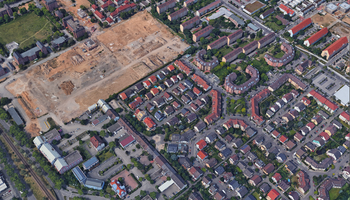Der Verband Region Rhein-Neckar setzt sich im Rahmen des Arbeitsfelds Flächenmanagement dafür ein, die Überbauung von Freiflächen außerhalb von Siedlungsbereichen zu verringern. So sollen möglichst viele Flächen für die Landwirtschaft, aber auch für Ökologie und Naherholung, erhalten werden indem vorrangig innerörtliche Brachflächen einer Neu- bzw. Wiedernutzung zugeführt werden. Diese Bemühung spiegelt auch der Einheitliche Regionalplan wider. Demnach sollen Städte und Gemeinden künftig noch stärker dem raumplanerischen Leitprinzip „Innen- vor Außenentwicklung“ folgen und vorhandene Flächenpotenziale nutzen.
Innenentwicklungs- und Reaktivierungspotenziale nutzen
Um die Innenentwicklungs- und Reaktivierungspotenziale in den Kommunen der Metropolregion Rhein-Neckar zu identifizieren, hat der Verband Region Rhein-Neckar zwischen 2006 und 2009 gemeinsam mit den Kommunen das Projekt „Raum+Rhein-Neckar“ umgesetzt. Im Ergebnis standen in den Ortskernen der Städte und Gemeinden der Rhein-Neckar-Region insgesamt rund 1.400 Innenentwicklungspotenziale mit einer Gesamtfläche von über 1.800 Hektar zur Verfügung.
An die Ergebnisse von „Raum+ Rhein-Neckar“ schloss „Raum+ AKTIV“ an, das der Verband Region Rhein-Neckar in Kooperation mit den Regionalverbänden Mittlerer Oberrhein und Nordschwarzwald durchführte. Ausgewählte Kommunen standen in dem von den Ländern Baden-Württemberg, Hessen und Rheinland-Pfalz geförderten Projekts Modell für die Reaktivierung bislang ungenutzter Flächen in Ortskernen. Ziel war es exemplarisch zu zeigen, wie die identifizierten Potenziale in der Praxis genutzt werden können und was es dabei zu beachten gibt.
Die erfolgreiche Umsetzung von „Raum+ Rhein-Neckar“ machte Schule: Rheinland-Pfalz weitete das Projekt zum Zweck eines Siedlungsflächenmonitorings unter dem Namen „Raum+ Monitor“ auf das ganze Bundesland aus.
Regionales Siedlungsflächenmonitoring „Raum+Monitor Rhein-Neckar“
Mit der Teilfortschreibung des Kapitels „Wohnbauflächen“ im Einheitlichen Regionalplan schafft der Verband eine neue Grundlage zur quantitativen Abschätzung der Flächenbedarfe in der Region. In diesem Zusammenhang ist es notwendig eine aktuelle und flächendeckende Übersicht der zur Deckung des Bedarfs noch vorhandenen Flächenreserven zu erhalten und diese Flächenpotenziale für eine zukunftsfähige Siedlungsentwicklung zu bewerten. Mit dem Ziel einer systematischen, kontinuierlichen Erfassung der Siedlungsflächenpotenziale baut der Verband auf den bisherigen Projekten in der Metropolregion Rhein-Neckar auf und weitet den in Rheinland-Pfalz landesweit etablierten „Raum+Monitor“ als regional einheitliche Erhebungsplattform auf alle Teilräume der Region aus.
Mit Hilfe dieser internetgestützten Erhebungsplattform können die Kommunen die Ersterhebungsdaten selbständig aktualisieren und auswerten. Über die rein quantitative Zusammenstellung hinaus, ermöglicht die Erhebung eine differenzierte thematische und räumliche Auswertung der Mobilisierungschancen in den unterschiedlichen Vor-Ort-Situationen.
Raum+Monitor nutzt als zentrales Werkzeug eine internetgestützte Online-Erhebungsplattform. Mit diesem dezentral zugänglichen, fortschreibungsfähigen und passwortgeschützten System ist die Einsicht und Pflege der Siedlungsflächenreserven mit relativ geringem Aufwand zu organisieren. Dabei ist grundlegend, dass die Erhebung und Fortschreibung durch die kommunale Ebene dezentral, aber dennoch einheitlich erfolgt. Damit stehen die Daten der Siedlungsflächenpotenziale neben dem Verband Region Rhein-Neckar nur der jeweiligen Kommune bzw. dem Träger der Flächennutzungsplanung für ihren jeweiligen Zuständigkeitsbereich zur internen Verwendung zur Verfügung. Zur Fortschreibung der Daten wird Raum+Monitor den Kommunen kostenlos zur Verfügung gestellt.
weitere Infos zum Raum+Monitor Anmeldeformular zum Raum+Monitor